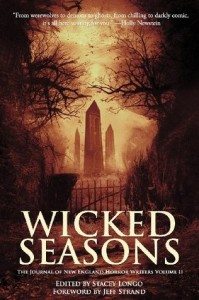Stacey Longo, Editor
NEHW Press
ISBN: 978-0615918839
November 6, 2013; $10.76 PB
Reviewed by Sam Gafford
Horror is not the same for everyone. What scares you may not necessarily bother me. The genre can be extremely subjective. But it is the mark of a good writer to take what scares them and scare others with it.
That is what you will find in the fourteen tales collected in WICKED SEASONS.
Anthologies without themes seem to be scarce these days. Perhaps publishers prefer to use themes as marketing tools. Put out a “Cthulhu” themed anthology and you’re probably guaranteed a certain amount of sales.
Conversely, as a reader, a un-themed anthology can be something of a risk. You never know what you’ll get like in that damn box of chocolates. Still, the point of every story should be to scare you no matter how they arrive at that goal, even if they end up using that coconut cluster chocolate that no one really likes.
I approached this collection with an open mind. “Scare me,” I thought to myself… and they did.
There’s precious little here in terms of what one might call ‘traditional’ horror. Lovecraft’s not in sight, neither are there vampires or ghouls, and the werewolves of Rob Smales’ “A Night at the Show” and Errick A. Nunnally’s “Lycanthrobastards” are not typical either. A better description might be that these stories owe more to the old TWILIGHT ZONE television show than any ‘blood & guts’ genre (although there is some of that here as well).
There are cases of hauntings like Addison Clift’s “Furious Demon”, about a woman haunted by her dead father who may, or may not, have molested her as a child. Clift crafts an atmosphere of suffocating dread throughout the story so that when the end comes, it leaves you drained and with a feeling of utter helplessness.
In James A. Moore’s “Spirits”, there is a ghost of a different type that echoes classic writers like M. R. James and H. R. Wakefield. It is the kind of haunting curse that strikes good and bad alike with a malevolent wickedness. Paul McMahon’s “Chuffers” could have been a story written by Richard Matheson with the combination of modern life and outside weirdness as creatures appear to steal a man’s memories of his ex-lover bit by bit.
The more visceral is represented by Michael J. Evans’ “Hungry for More”, where a man’s visit to a favorite bed & breakfast turns bad insanely quickly while in Catherine Grant’s “Three Fat Guys Soap”, an unlikely method of soap making becomes an avenue for revenge that strikes after an unrelenting build-up. Each story shows the inherent horror that can exist within any human very well.
A legendary demon is the cause of the terror in Robert J. Duperre’s “The Basement Legs” which, in structure and tone, reminds me of some of Stephen King’s early short story work. A futuristic world where death has been defeated arises in Kristi Petersen Schoonover’s “The Chance Tomorrow”, but as any fan of TWILIGHT ZONE would know, nothing comes without a price. A fable-like universe appears in Lucien E.G. Spelman’s “The Girl Who Wouldn’t Break” which derives horror not just from the events but also from the actions of the oh-so-well-meaning villagers. Its underlying theme is perhaps one of the most disturbing in the book.
“The Secret Backs of Things” by Christopher Golden would have been right at home in a collection of Rod Serling tales. It plays with the reader before producing the knock-out punch in the final paragraph. Were horror anthology shows still being produced, this could easily have been an episode.
Finally, there is Scott T. Goudsward’s “Blind Prophet” which manages to combine plot twists with a backstory of child abuse and religious mania. It’s a sharp sword that Goudsward dances on but the final twist pays off in the end. The story is excellently crafted and will remain with the reader long after the book is put down. Robert Bloch would have been happy to produce such a tale.
WICKED SEASONS is, very loosely, based on horrors of New England even though not all of the stories take place there. They do, however, share the unique tone of horror that all New Englanders come to accept during long, cold winters when isolation is inescapable and a knock on the door can reduce one to a quivering mass of fear. This book is the perfect companion for an Arctic Vortex when we are reminded that humanity is so very small and frail and the things that lurk outside are so very large and hungry.









